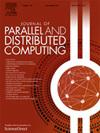FSCD: File system controlled coupled defragmenter for mobile storage systems
IF 4
3区 计算机科学
Q1 COMPUTER SCIENCE, THEORY & METHODS
引用次数: 0
Abstract
NAND-Flash-based mobile devices have gained increasing popularity. However, fragmentation in flash storage significantly impedes the I/O performance of the system, which leads to a poor user experience. Currently, the logical fragmentation is decoupled from the physical fragmentation and garbage collection is typically controlled by the Flash Translation Layer (FTL), degrading the garbage collection efficiency. In this paper, a novel fragmentation handling strategy, namely the File System controlled Coupled Defragmenter (FSCD), is proposed in which the file system is used to control the garbage collection, and couple the logical and physical fragmentations, synchronizing between the logical and physical defragmentation. As a result, FSCD can significantly reduce fragmentation and improve system performance in the fragmented state. Experimental results showed that the performance of Sequential Read/Sequential Write and Random Read/Random Write had been improved by 393.7%, 356.2% and 126.0%, 296.0% over the conventional FTL, respectively. FSCD alleviates fragmentation, improves I/O performance, and enables a better user experience, which provides a solution for the next generation of the NAND-flash-based mobile storage system.
移动存储系统的文件系统控制耦合碎片整理程序
基于nand闪存的移动设备越来越受欢迎。但是,flash存储中的碎片会严重影响系统的I/O性能,从而导致较差的用户体验。目前,逻辑碎片与物理碎片是分离的,垃圾收集通常由Flash转换层(FTL)控制,降低了垃圾收集效率。本文提出了一种新的碎片处理策略,即文件系统控制的耦合碎片整理器(FSCD),该策略利用文件系统控制垃圾收集,将逻辑碎片和物理碎片进行耦合,在逻辑碎片整理和物理碎片整理之间进行同步。因此,FSCD可以显著减少碎片,提高系统在碎片状态下的性能。实验结果表明,与传统的FTL相比,顺序读/顺序写和随机读/随机写的性能分别提高了393.7%、356.2%和126.0%、296.0%。FSCD解决了碎片化问题,提高了I/O性能,提供了更好的用户体验,为下一代基于nand闪存的移动存储系统提供了解决方案。
本文章由计算机程序翻译,如有差异,请以英文原文为准。
求助全文
约1分钟内获得全文
求助全文
来源期刊

Journal of Parallel and Distributed Computing
工程技术-计算机:理论方法
CiteScore
10.30
自引率
2.60%
发文量
172
审稿时长
12 months
期刊介绍:
This international journal is directed to researchers, engineers, educators, managers, programmers, and users of computers who have particular interests in parallel processing and/or distributed computing.
The Journal of Parallel and Distributed Computing publishes original research papers and timely review articles on the theory, design, evaluation, and use of parallel and/or distributed computing systems. The journal also features special issues on these topics; again covering the full range from the design to the use of our targeted systems.
 求助内容:
求助内容: 应助结果提醒方式:
应助结果提醒方式:


